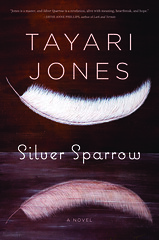- Tayari Jones
- So What's Your Book About: Learning To Talk About My Own Work

It has occurred to me, SheWriters, that I haven’t even told you anything about my new novel, SILVER SPARROW. And this dovetails perfectly into my challenge for this week—How to talk about my book. It’s a tricky proposition. I want something punchy that people can remember, but I also want to do justice to my project. When someone asks me "What's Your Book About?" I could answer that a thousand different ways. It's almost as bad as "Tell me about yourself." I have no idea where to start.
Here’s what my publisher has written on the dust jacket:
With the opening line of Silver Sparrow, “My father, James Witherspoon, is a bigamist,” author Tayari Jones unveils a breathtaking story about a man’s deception, a family’s complicity, and two teenage girls caught in the middle.
Set in a middle-class neighborhood in Atlanta in the 1980s, the novel revolves around James Witherspoon’s two families—the public one and the secret one. When the daughters from each family meet and form a friendship, only one of them knows they are sisters. It is a relationship destined to explode when secrets are revealed and illusions shattered. As Jones explores the backstories of her rich yet flawed characters—the father, the two mothers, the grandmother, and the uncle—she also reveals the joy, as well as the destruction, they brought to one another’s lives.
At the heart of it all are the two lives at stake, and like the best writers—think Toni Morrison with The Bluest Eye—Jones portrays the fragility of these young girls with raw authenticity as they seek love, demand attention, and try to imagine themselves as women, just not as their mothers.
As you can imagine, I cannot go around speaking about myself in these terms. (I can just see myself saying “Think Toni Morrison…”) But exactly how does a person talk about her book? There's no avoiding it. It has to be done.
There was a time when I would say, “Silver Sparrow is about bigamy.” Then people would say, “Like Big Love?” So then I started saying, “It’s about bigamy, the lying, cheating kind, not the religious kind.” This gets more to the heart of the novel, but the tone is off. It wasn’t a description, it was a pitch. And while it’s an accurate characterization of the subject matter, it wasn’t a true portrayal.
What I have settled on is not a one-sentence summary. I worked five years on the novel and I feel that I owe it more than a five-second run-down. I have been told a million times that you have to be able to talk about your book in ten words or less. I think that so many guides to marketing forget the fact that these books are our babies in so many ways. A novel is not just an object to sell. I would even argue that when we start to talk about it as an object, people think of it as an object. But when we slow down and speak of it as a lovingly crafted work of art, others will treat it the same way.
I believe the best marketing tool is your own sincerity. We do interviews, tours, book club meetings, et cetera because we want to connect with readers. If we’re speaking in sound bytes and jingles we are not respecting ourselves, our work or our readers. And without respect, there is no connection.
Now, when someone asks me about my book, I say this—
Silver Sparrow is about two girls that have the same father. One knows, but the other lives in the shadows. It’s also about the wives, the acknowledged one, and the secret one. I wrote it because there are many people who live this way, and I really wanted to try and figure out how people can connect with each other and overcome the shame, anger and hurt in order to take responsibility for their own lives.
Just now, I timed myself saying that and it took twenty-one seconds. My book deserves at least that much.
_____
Now, over to you, SheWriters-- are you comfortable talking about your own work? How do you describe your project?
Writing Status Badges












Writing Status Badges












Featured Members (7)
Writing Status Badges



































I have a book coming out in 2012 and I struggle with this as well. As I've come to expect your blog cuts to the heart of the matter, bringing clarity. Much as we're committed to marketing our books, we're writers first who birthed these books through hard labour. I'm still struggling to find the words, but thanks for reminding that we're not just selling objects but sharing our offspring with the world (knock on wood).
Oh my! I struggle with the exact same thing. I remember I was lucky enough to introduce Dorothy Allison when she was a visiting professor at my school and then see her again in Austin and then once more at AWP all within a small enough timeframe that by the time I got to Chicago she greeted me with a hug and said those deadly words "So tell me about what you're working on. What do you write about."
I said "I write fiction." and zeroed in on the exit I just said the other night when I tucked myself into bed. "I gotta learn how to talk about my work." I think it's embarrassing or something. I don't know. I think I'm afraid because I think it might require bragging and I'm not a good bragger.
Ten words? I recently got mine down to fifteen and was feeling very proud.......huh.
This I'd have trouble with....describing my novel in 21 seconds. But 10 words?? The idea of the so-called elevator pitch gives me hives. Why is it so hard to talk about a novel I've lived with for almost 10 years??
Great post! To take a break from actually writing my novel, I play around with summaries. I love the reminder to make sure to honor the book itself—not to mention the love for the story that's driving me to write it in the first place—instead of focusing only on crafting a perfect elevator pitch.
Great book subject, too. I knew a family a bit like this when I was growing up. The father was famous in his circles (he was an architect), and had two distinct families, one public and one largely hidden. I went to school with hidden family's son, who grew up to be a documentary filmmaker and made a movie about it. Fascinating. (The documentary is called MY ARCHITECT, by the way—it's beautifully done, and I highly recommend it.)
Fabulous! I love the dust jacket copy, your pitch, your thoughtful insights, all of it! What a great way of thinking about marketing your work. Can't wait to read the book.
Nice summary. I like thinking in terms of respecting ourselves, our work, and our readers when explaining what a book is about. That's a much better starting point than "what can I say in 10 words."
Tayari, I can't thank you enough for this post. Having been a reader all my life I am now attempting to write my memoir. It has been difficult to find those precious few words that describe the work and peak interest, and defend against the instant comments. I have been the teenage mother of a disabled child, sex worker, mafia mistress, wife of a multi-millionare, business owner and a "Whore" according to Warhol in his diary. Yet when I recite my elevator speech, I am usually asked about sex work.
To answer the question, I am finally comfortable.
Can't wait to read it.
thank you!!! I always feel like the only one who can't put it into words...I really do like that you added the reason you wrote the book as part of your pitch. I will try that :)
It's so amazing for me to come across such a wonderful post today, as I just finished with an interview on blog talk radio this afternoon. And there it was, very first question -- the one guaranteed to strike fear into my heart. The very important, understandably, and inevitably asked, "So, tell us what your book is about..." Why is this so very difficult? Possibly because it is so essential? I think what I really need to do is follow your cue and remember that, truly, sincerity is the language that translates best of all.
Thank you, Tayari. Your novel sounds quite intriguing
I think I've become comfortable talking about my work because I meet with bookclubs and they not only ask me questions that make me think about my own work but sometimes offer insights into the multi layers of meaning that I had actually missed. I can't remember his name, but you remember that French author who wrote that he learned about himself by reading what he'd written? My books are written in the style known as magical realism and the influence of mythology as well as Jungian psychology is strong and obvious. So when asked what Stillbird is "about" I don't say domestic violence as that is only part of it but "various facets of violence against women put into a sociological as well as historical perspective" . . . when asked what is "The King and The Clockmaker" about I can honestly say that it is about the genesis of evil, the functionality of art and the complexities of how we understand the concept of "time" . . . a metaphysical and meta fictional novella, and so on and so forth. I wrote a little essay for the second edition of my first novel, The Nun, in which I mentioned an essay that was posted online some years ago by a man who talked about what I as an author was doing in this novel. It was flattering to have been the subject of his analysis although I had not intended to address the issue that he thought I had. Maybe that is what makes the psychological process of creating fiction so fascinating. But I realize as I write this that I am not addressing the question of how to PROMOTE one's book, I am addressing the question of how to study one's book.
Tayari, I too have difficulty talking about myself and what I do although I do think that it is deserving. And thank you for addressing the pitch issue in a realistic way. I don't think it is fair to the writer or the book (I write plays but same idea) to be forced to sum up the hard work and emotional investment that went into it as though you were in a race.
Funnily enough I had the exact same problem recently, and with your novel. I just reviewed a preview copy of this for For Books Sake, and I found it incredibly hard to define and box. When I had to give recommendations for similar reads, I was boggled for a while. That's why your Toni Morrison comment above made me giggle a bit. (Just in case you're wondering, I went for Donna-Daley Clarke's Lazy Eye as a sort of British equivalent. A bit of a curved ball maybe, but it felt right to me).
In my creative writing classes, we did a lot of exercises where you sum up your novel in a hundred words, then fifty, then ten and eventually in two words. Although, in retrospect I agree that this is probably selling your novel short, I found it a great exercise to focus my mind and define for myself what the novel is about. Some novels have a more simple idea behind them anyway, and therefore you'd feel better about just summing them up in a sentence. But I can definitely see why a project like Silver Sparrow would be difficult to shrink in to a sound-bite.
@Rebecca, I think the key is to remember that it's not about this one book-- it's about your career. Set your long term goals, which may be more than just moving units. Building a career takes a while. You want to slowly build real readers. Just slow down and don't be anxious. I know that's vague, but it really works.
Thanks for sharing your concerns on this, Tayari. I recently learned that authors bear a greater responsibility of their book's promotion than I realized. What have been your best resources for learning to overcome not being, as you put it, "a crackerjack salesman"?
@Adriana, the book is being published by Algonquin. They have been amazing.
Also, I know I am going against conventional wisdom, that you have to be a crackerjack salesman. I am thinking this is not really true. This is not to say that you don't have to do ANYTHING to promote your book, but you don't want to come off as a snappy pitchman. It's not a good look.
Tayari ~
I thought it best to comment directly to you right here, rather than on your Facebook link. I totally hear where you're coming from on this, and feel much the same way. Yet, at the same time, I understand how important it can be to find the right combination of words to succinctly state a project in a way that gives both substance and heart in a one sentence synopsis. Simple or easy? Not at all! But possible? Yes. This is where I say that I believe that my book deserves that much. And, yes, I feel quite comfortable talking about my own work -- because I believe it to be that important, that needed, that relevant -- until someone absolutely convinces me they frankly don't give a damn.
Kathy
Great post, Tayari, and my answer is No! I'm not comfortable talking about my work and I never know what to say. I'm sure I come across as someone who didn't even bother to read her own book let alone write it! I usually say something very lame and incredibly inadequate that includes the words Puerto Ricans and marriage, but I'm working on forming a coherent sentence.
BTW, I love the cover - it's beautiful. Who's your publisher?
Great post! I think your description is wonderful, except that I would reverse the order and talk about the two wives first. The two girls who have the same father doesn't really convey the main idea of bigamy - it makes them sound like sisters. My $.02, and worth about as much. ;)
I love your message, though, about giving your book more respect. I, too, hate the idea of a sales pitch. A book is an idea, something that has been grown from a seed into a beautiful plant. You can't just hack away at the plant to get to the main stem - it renders the plant ugly, and the creator uncaring.
I'm not sure how I'd describe my projects, but you gave me something important to think about. So thank you from the bottom of my writing heart! :)
A.R.
Family dysfunction, as old as time. Anyway, yes, this is a challenge. I think your first three sentences summarize nicely when you need something brief. I especially like the way it ends with "...the secret one." Just enough to make me want to read it.
Hello
Thanks for the information.